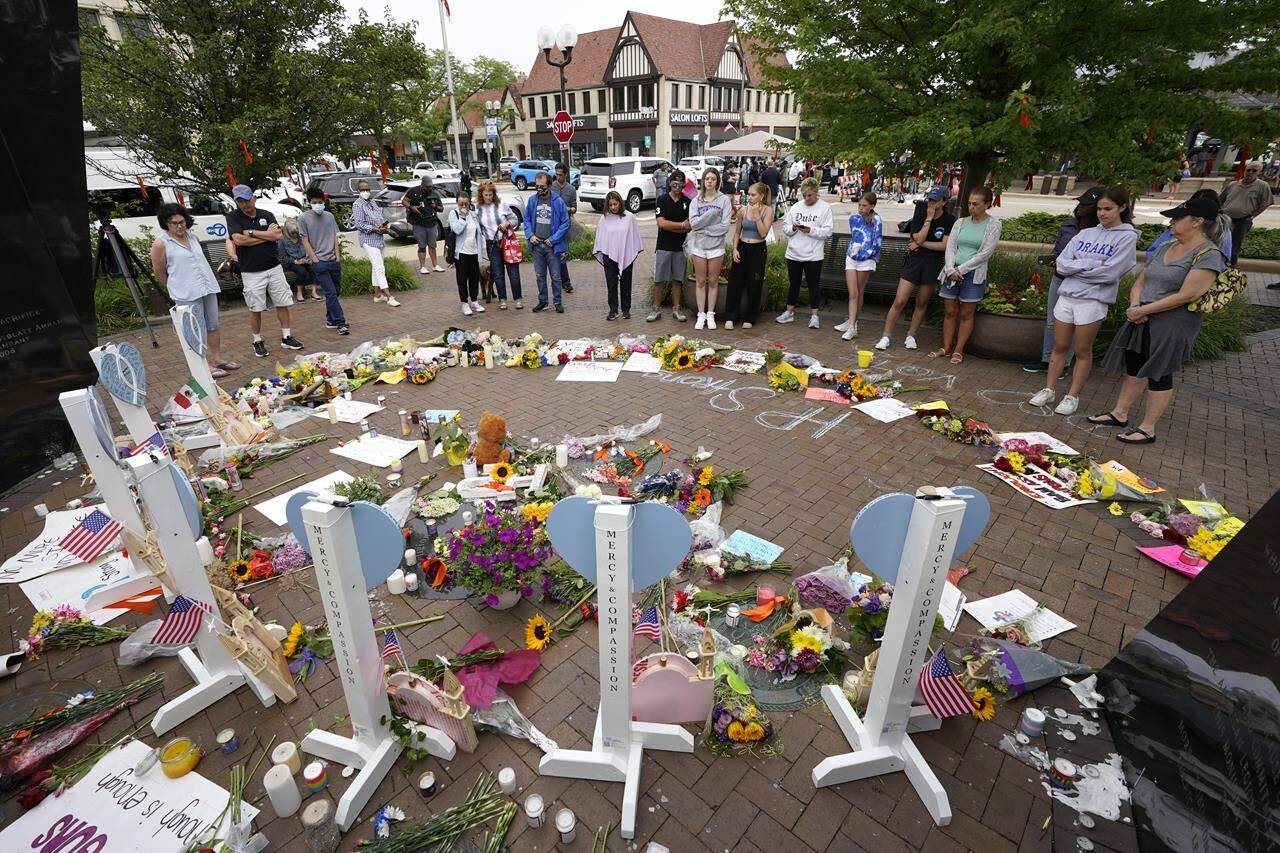The trauma of the Fourth of July was already beginning to yield to life’s regular rhythms Wednesday, just 48 hours after America’s latest mass shooting brought tragedy and infamy to another tranquil U.S. community.
At Central Avenue and Green Bay Road, commuter traffic — that fixture of every large American city’s suburban margins, to say nothing of Chicago — returned to a junction that has been closed to vehicles, and a backdrop on live TV, for much of the last two days.
Residents, aiming to add to the growing heap of flowers and cards across the street, suddenly found themselves dodging cars and trucks, some of which slowed long enough to gawp at the spectacle.
Beyond the remaining barricades, the camping chairs, ice coolers, blankets and bikes that parade spectators left behind as they fled a barrage of savage gunfire were gone, spirited away by a full-size U-Haul.
Only the flowers, the yellow police tape and the lingering presence of investigators and media, the latter now relegated to one of two designated street corners, offered clues to what had transpired.
In a country where mass shootings have been happening on a weekly basis, routine is already coming back to Highland Park — and for some, it’s not welcome.
“I don’t want to normalize it, because it certainly shouldn’t be normal,” said Heidi Ross, an art teacher from nearby Northbrook who stopped by with her friend Jill Radke to pay their respects.
“Has there been a lot of it happening? Absolutely. And it’s just — I’m very frustrated. I just don’t know what it’s going to take.”
Seven people were killed and 38 people were injured Monday when a lone gunman, perched on a roof of a sportswear store and disguised in women’s clothing, opened fire on parade spectators, unleashing more than 80 rounds on the defenceless crowd.
The dead included Irina McCarthy, 35, and her 37-year-old husband Kevin, who were killed while shielding their two-year-old son from the danger. Locals say the boy is now staying with his grandparents.
Eduardo Uvaldo, 69, was at the parade with family members when he was struck in the arm and the back of the head. He died of his injuries in hospital early Wednesday.
Also dead are Highland Park residents Katherine Goldstein, 64; Jacquelyn Sundheim, 63; and Stephen Straus, 88; as well as Nicolas Toledo-Zaragoza, 78, of Mexico.
Police say a number of the wounded remain in critical condition and warn that the death toll could still grow.
Police have charged Robert E. “Bobby” Crimo III with seven counts of first-degree murder, and expect to file additional charges, officials say. Crimo was ordered held without bail Wednesday.
Authorities say Crimo confessed to police about the shooting and described fleeing to Madison, Wisc., about two hours away, where he briefly contemplated staging a second shooting before changing his mind.
Irwin Silbernik, 70, could only shrug at the evidence of life already returning to normal, and the question of whether the community that has been his home for 36 years will ever be the same.
“That’s the million-dollar question, isn’t it? At this point, even if guns were illegal, they’re out on the streets — they’re there,” Silbernik said.
“You know, I don’t think the answer is more guns. I don’t think the answer is getting guns to protect yourself. I don’t think the answer is arming teachers. But I don’t know what the answer is.”
Illinois laws are designed to keep guns out of the hands of people with drug problems, felony convictions or are a risk of harming themselves or others. The state’s red-flag law also allows the seizure of weapons under certain circumstances, but family members, roommates or police must petition a judge first.
Officials say police had two previous encounters with Crimo, both in 2019: the first when he was reportedly suicidal, then again later that same year when a family member reported that Crimo had a collection of knives and that he was threatening to “kill everyone.” No charges or complaints were filed.
Only three months later, he applied for a gun owners’ licence, Illinois state police said. His father sponsored the application because he was 19 at the time.
Crimo legally purchased five guns, including the rifle used in the attack and one found in a vehicle with him when he was arrested, as well as handguns and other firearms seized at his father’s home.
“I want parents to step up on when their kids have issues and deal with them, not put your head in the sand,” said Ross.
“I don’t know what it’s going to take for Congress to act. But we need strict gun laws. And clearly, this kid fell through the cracks.”
In Richmond, Va., police said Wednesday that a “hero citizen” may have helped thwart another July Fourth massacre after overhearing a conversation about plans to shoot up a local amphitheatre.
Acting on the tip, police arrested two men and recovered two assault rifles, a handgun and 223 rounds of ammunition.
Monday’s shooting came just six weeks after a deadly elementary school rampage in Uvalde, Texas, killed 19 children and two teachers, shocking — but not surprising — a country now utterly awash in staggering firepower.
Two weeks before Uvalde, 10 people were killed and two injured in a supermarket in Buffalo, N.Y., by a gunman armed with an assault-style rifle who was reportedly motivated by racist hatred.
For Radke and Ross, there’s only one thing left to do.
“We’re going to just try to move forward, one step at a time,” Radke said. “That’s what you have to do — just for your own mental health.”
—James McCarten, The Canadian Press
RELATED: Man detained in US July 4 parade shooting that left at least 6 dead, 30 hurt
RELATED: Gun violence in America: A long list of forgotten victims

